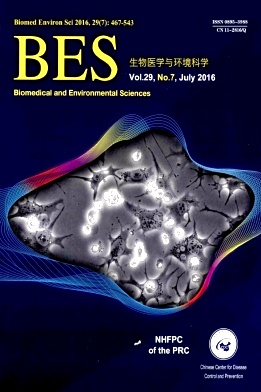Association of the ADIPOQ Rs2241766 and Rs266729 Polymorphisms with Metabolic Syndrome in the Chinese Population:A Meta-analysis
doi: 10.3967/bes2016.066
-
Key words:
- ADIPOQ /
- Polymorphisms /
- Metabolic syndrome /
- Meta-analysis
Abstract: Objective This meta-analysis was performed to summarize the association of the ADIPOQ rs2241766 and rs266729 polymorphisms with metabolic syndrome (MS) in the Chinese population.
Methods We searched for articles in MEDLINE via PubMed, EMBASE, HuGE Navigator, CNKI, and Wanfang databases and calculated odds ratios (ORs) with 95% confidence intervals (CIs) to determine the strength of associations in fixed- or random-effects models.
Results We included 21 articles in the meta-analysis: 17 reports of ADIPOQ rs2241766 with 3628 cases and 3000 controls and 8 of rs266729 with 2021 cases and 2226 controls. We found an increased risk of MS with the ADIPOQ rs2241766 polymorphism in some genetic models (allele model: OR=1.12, 95% CI:1.03-1.21; dominant model: OR=1.15, 95% CI: 1.04-1.28; homozygote model: OR=1.22, 95% CI:1.00-1.49) but no association with the ADIPOQ rs266729 polymorphism (allele model: OR=0.98, 95% CI:0.82-1.17; dominant model: OR=0.90, 95% CI: 0.79-1.02; recessive model: OR=1.09, 95% CI: 0.85-1.39;homozygote model: OR=1.03, 95% CI: 0.80-1.33).
Conclusion The results of this meta-analysis suggest an association between the ADIPOQ rs2241766 polymorphism and MS in the Chinese population. G allele of ADIPOQ rs2241766 increases the risk of MS. Better designed studies with different ethnic populations and larger sample sizes are needed for assessing the relationship between ADIPOQ rs2241766 and rs266729 polymorphisms and MS in the future.
| Citation: | ZHOU Jun Mei, ZHANG Ming, WANG Shu, WANG Bing Yuan, HAN Cheng Yi, REN Yong Cheng, ZHANG Lu, ZHANG Hong Yan, YANG Xiang Yu, ZHAO Yang, HU Dong Sheng. Association of the ADIPOQ Rs2241766 and Rs266729 Polymorphisms with Metabolic Syndrome in the Chinese Population:A Meta-analysis[J]. Biomedical and Environmental Sciences, 2016, 29(7): 505-515. doi: 10.3967/bes2016.066 |







 Quick Links
Quick Links
 DownLoad:
DownLoad: